Charles E W Bean, Diaries, AWM38 3DRL 606/116/1 - June - September 1918 - Part 8
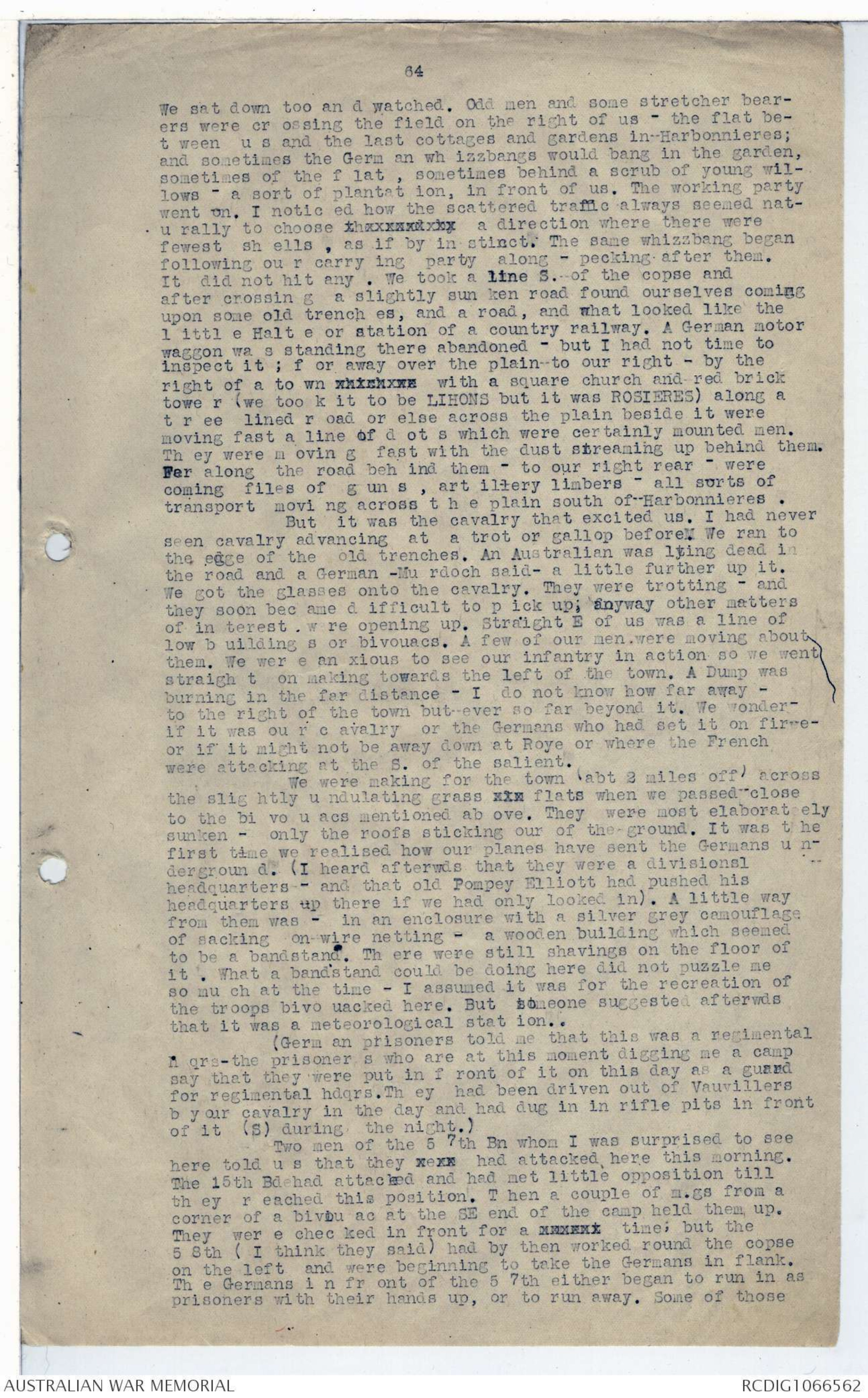
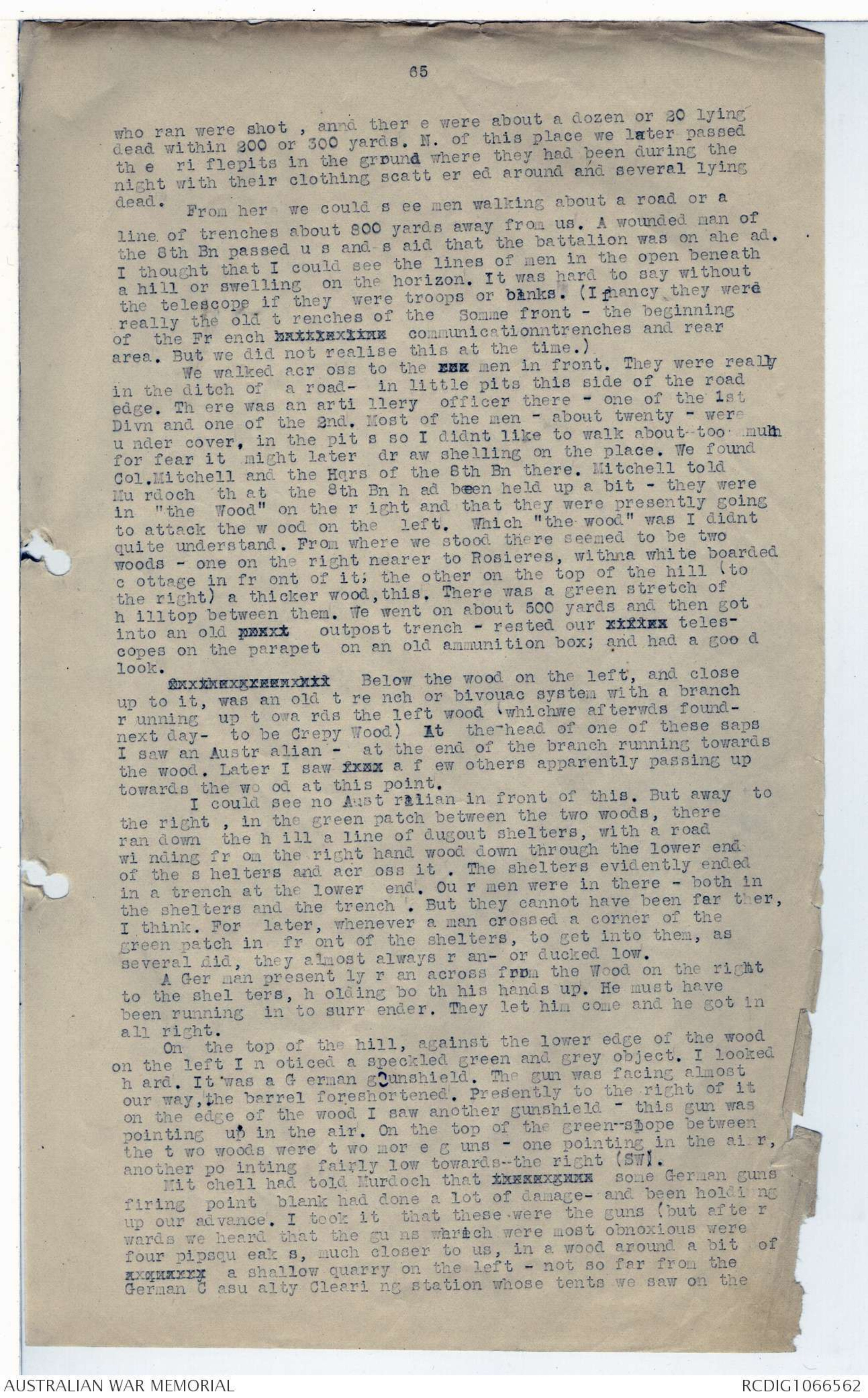
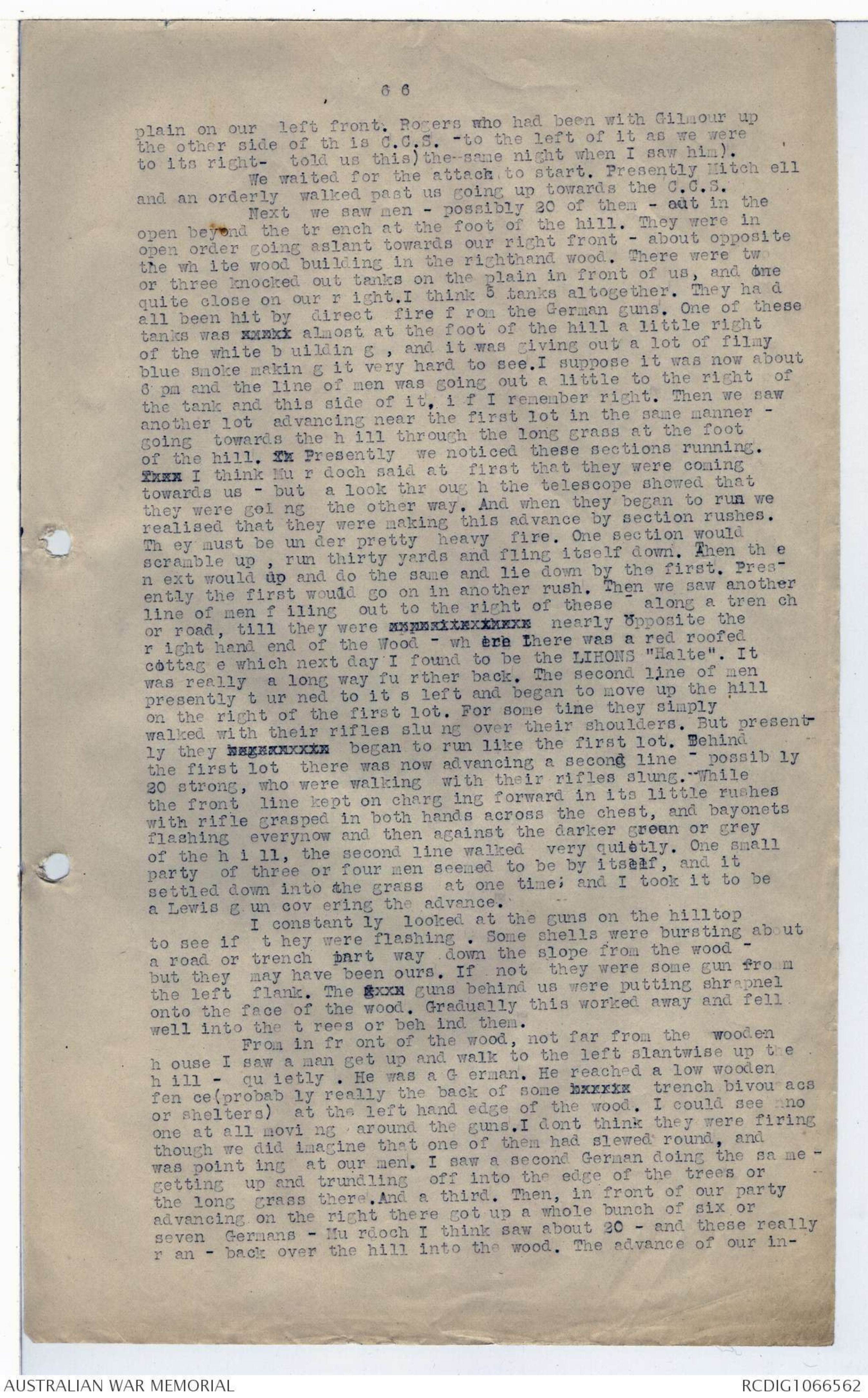
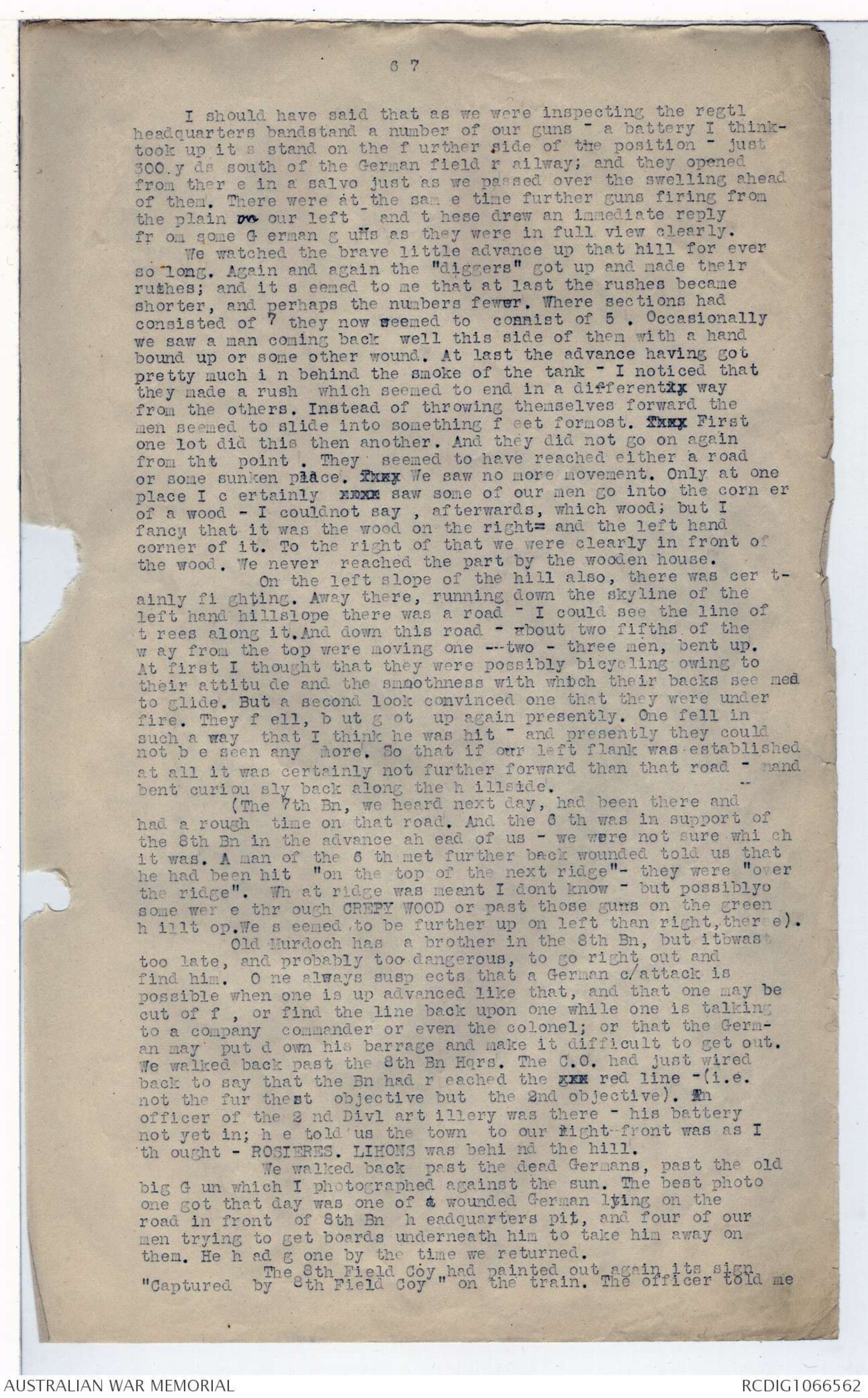
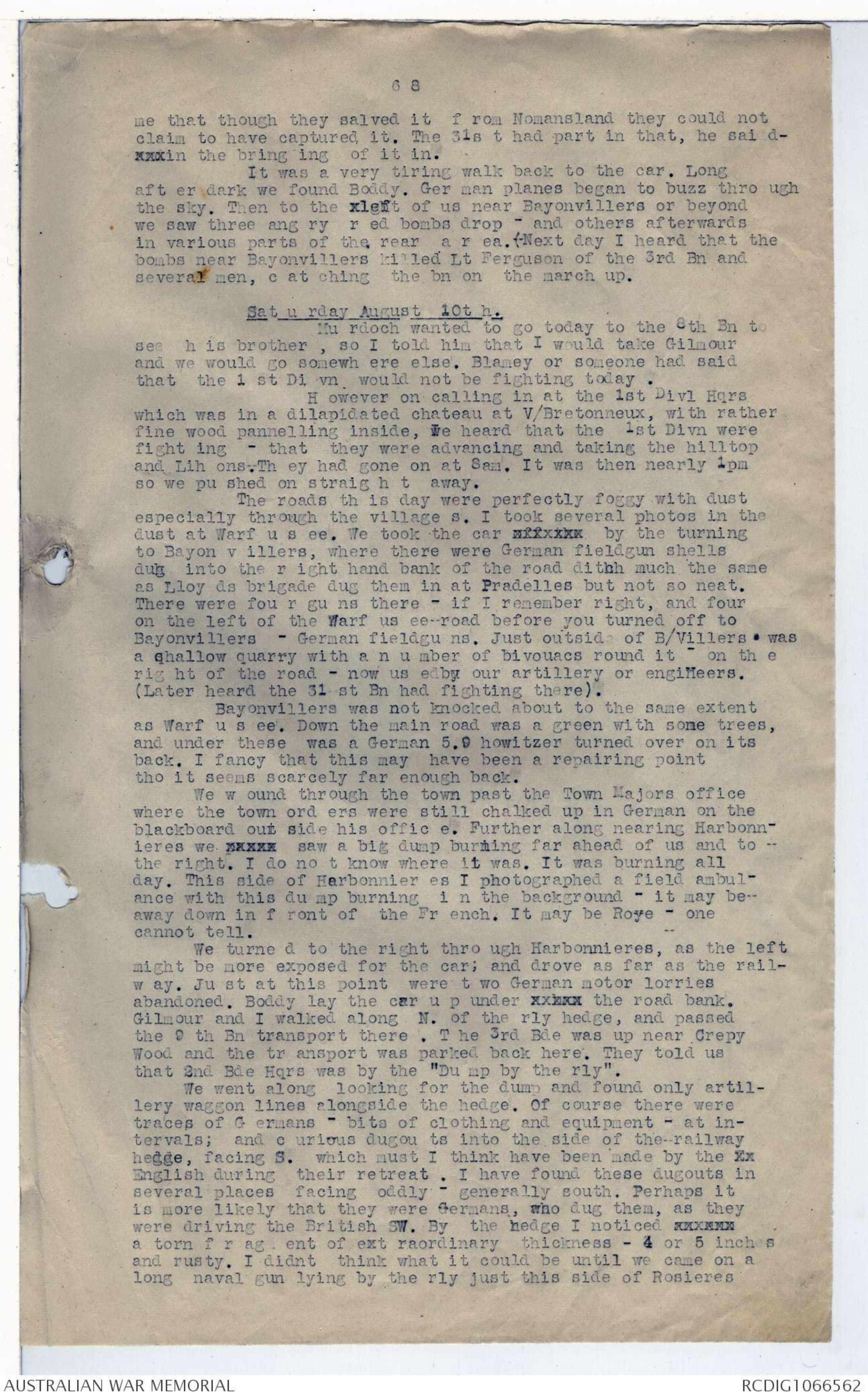
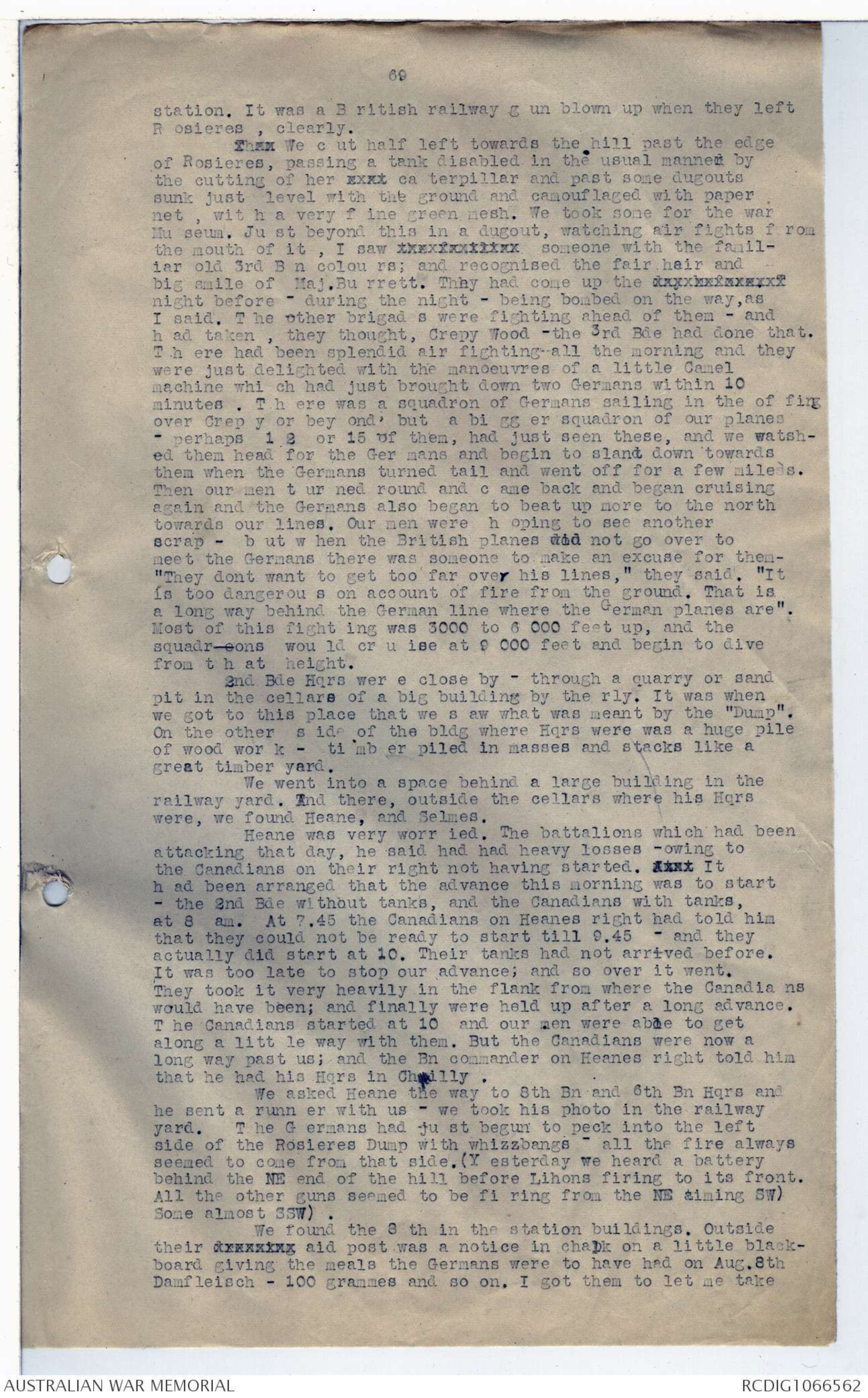
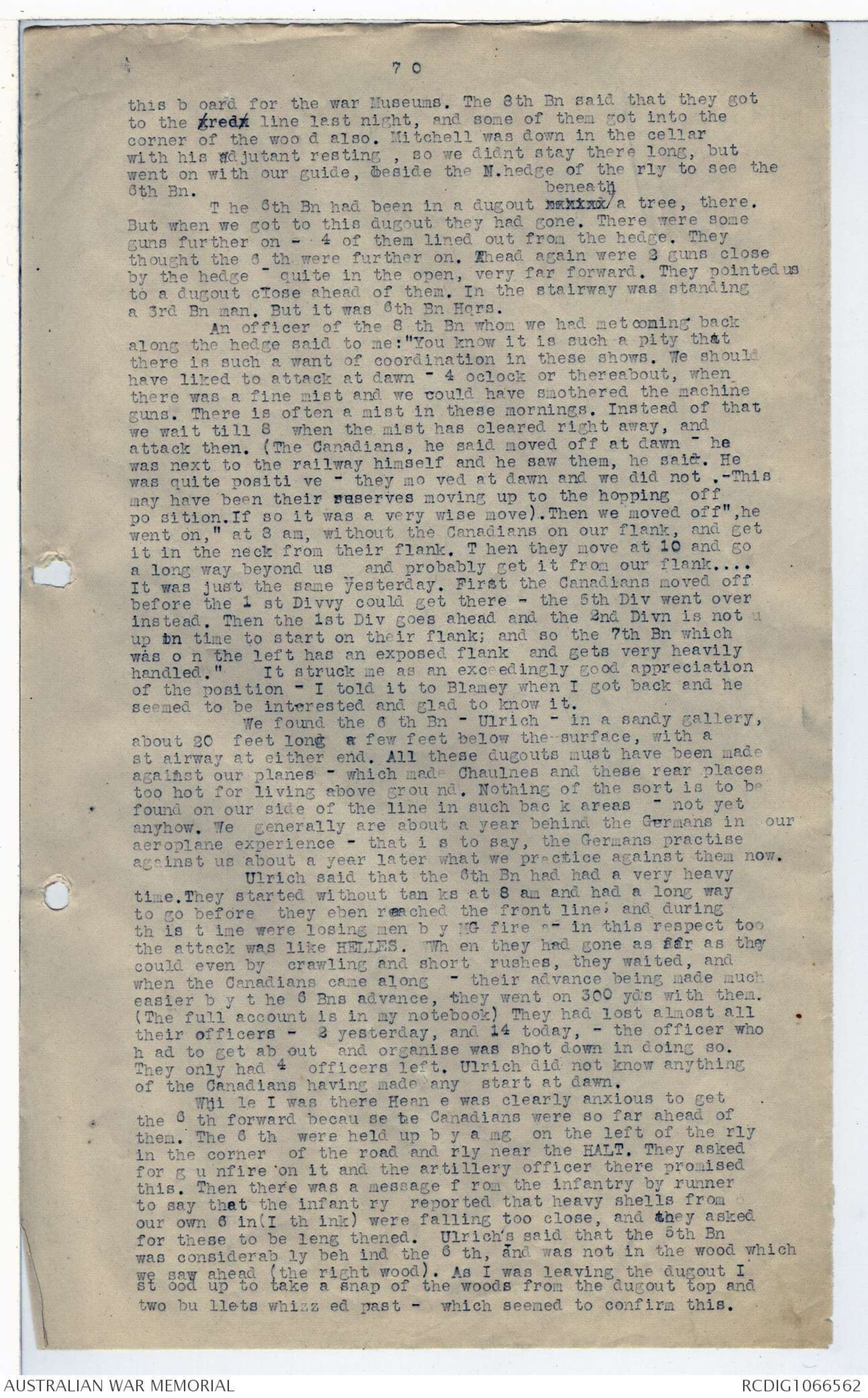
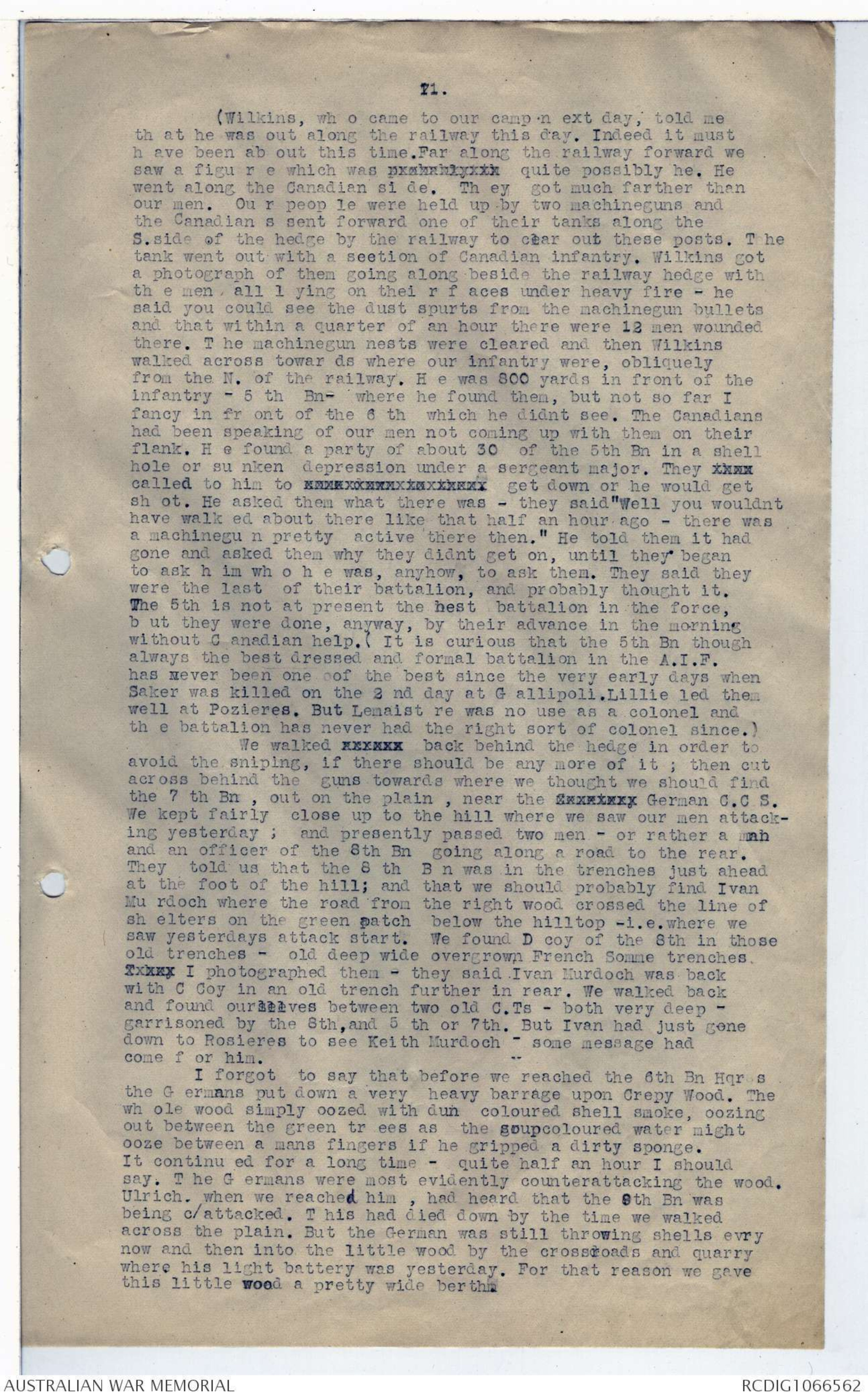
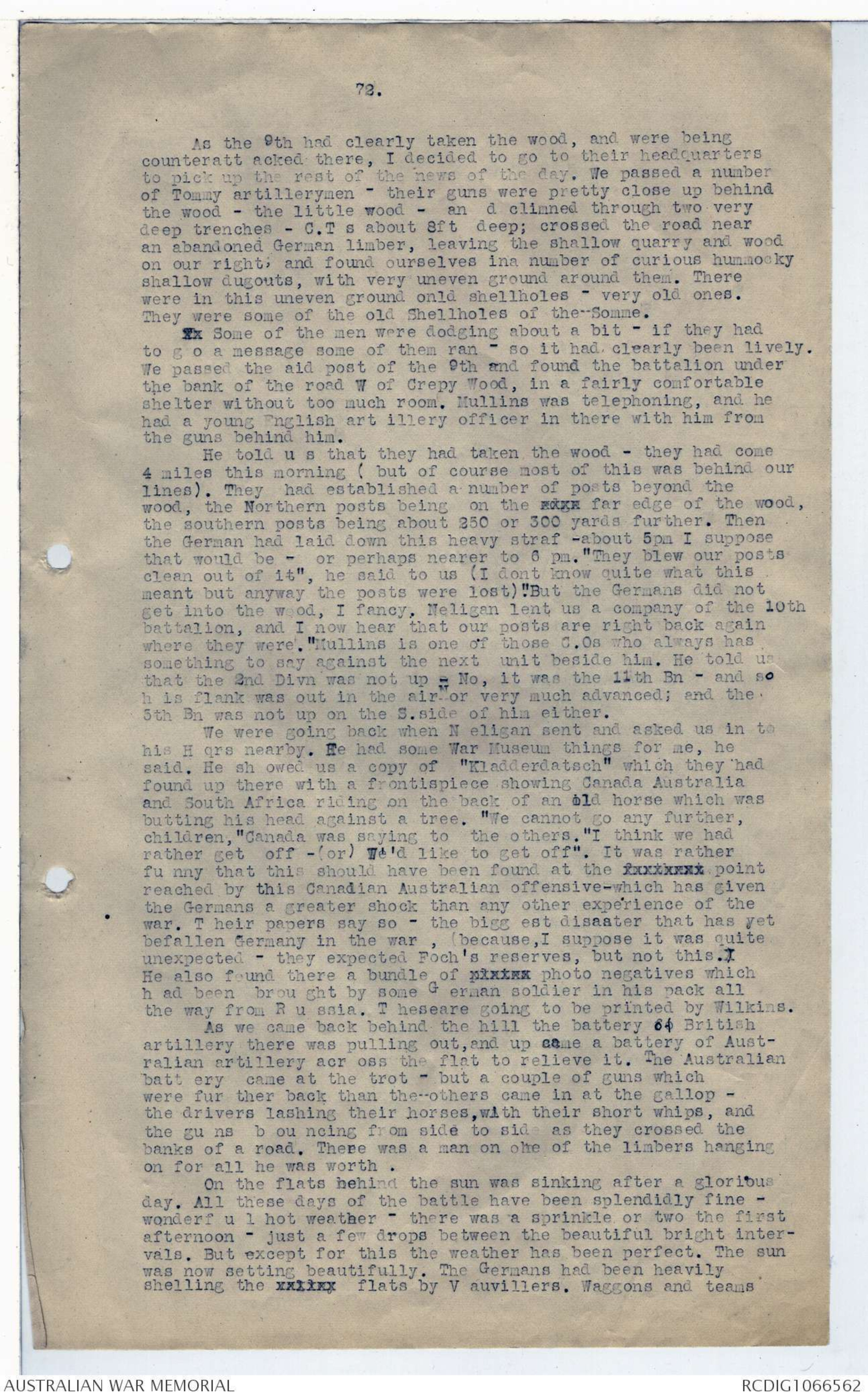
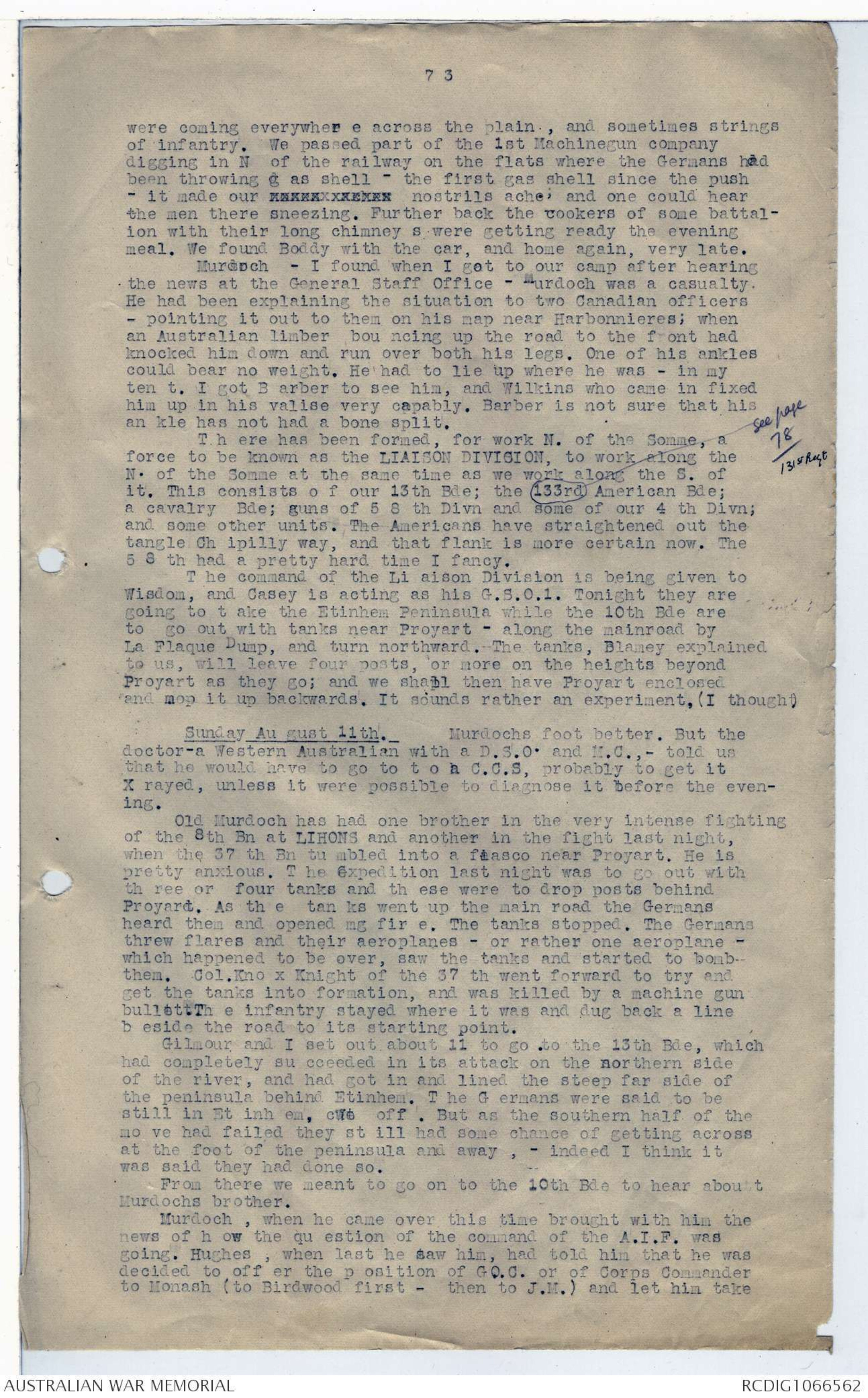
64
We sat down too and watched. Odd men and some stretcher bearers
were crossing the field on the right of us - the flat between
us and the last cottages and gardens in Harbonnieres;
and sometimes the German whizzbangs would bang in the garden,
sometimes of the flat, sometimes behind a scrub of young willows -
a sort of plantation, in front of us. The working party
went on. I noticed how the scattered traffic always seemed naturally
to choose xxxxxxxxxxx a direction where there were
fewest shells, as if by instinct. The same whizzbang began
following our carrying party, along - pecking after them.
It did not hit any. We took a line S. of the copse and
after crossing a slightly sunken road found ourselves coming
upon some old trenches, and a road, and what looked like the
little Halte or station of a country railway. A German motor
waggon was standing there abandoned - but I had not time to
inspect it ; for away over the plain to our right - by the
right of a town xxxxxxxx with a square church and red brick
tower (we took it to be LIHONS but it was ROSIERES) along a
tree lined road or else across the plain beside it were
moving fast a line of dots which were certainly mounted men.
They were moving fast with the dust streaming up behind them.
Fer along, the road behind them - to our right rear - were
coming files of guns, artillery limbers - all sorts of
transport moving across the plain south of Harbonnieres.
But it was the cavalry that excited us. I had never
seen cavalry advancing at a trot or gallop before. We ran to
the edge of the old trenches. An Australian was lying dead in
the road and a German -Murdoch said- a little further up it.
We got the glasses onto the cavalry. They were trotting - and
they soon became difficult to pick up; anyway other matters
of interest were opening up. Straight E of us was a line of
low buildings or bivouacs. A few of our men were moving about
them. We were anxious to see our infantry in action so we went
straight on making towards the left of the town. A Dump was
burning in the far distance - I do not know how far away -
to the right of the town but-ever so far beyond it. We wonder-
if it was our cavalry or the Germans who had set it on fire-
or if it might not be away down at Roye or where the French
were attacking at the S. of the salient.
We were making for the town (abt 2 miles off) across
the slightly undulating grass xxx flats when we passed--close
to the bivouacs mentioned above. They were most elaborately
sunken - only the roofs sticking our of the ground. It was the
first time we realised how our planes have sent the Germans underground.
(I heard afterwds that they were a divisional
headquarters - and that old Pompey Elliott had pushed his
headquarters up there if we had only looked in). A little way
from them was - in an enclosure with a silver grey camouflage
of sacking on wire netting - a wooden building which seemed
to be a bandstand. There were still shavings on the floor of
it. What a bandstand could be doing here did not puzzle me
so much at the time - I assumed it was for the recreation of
the troops bivouacked here. But someone suggested afterwds
that it was a meteorological station..
(German prisoners told me that this was a regimental
H qrs-the prisoners who are at this moment digging me a camp
say that they were put in front of it on this day as a guard
for regimental hdqrs.They had been driven out of Vauvillers
by our cavalry in the day and had dug in in rifle pits in front
of it (S) during the night.)
Two men of the 57th Bn whom I was surprised to see
here told us that they xexx had attacked here this morning.
The 5th Bdehad attacked and had met little opposition till
they reached this position. Then a couple of m.gs from a
corner of a bivouac at the SE end of the camp held them up.
They were checked in front for a xxxxxx time; but the
58th ( I think they said) had by then worked round the copse
on the left, and were beginning to take the Germans in flank.
The Germans in front of the 57th either began to run in as
prisoners with their hands up, or to run away. Some of those
65
who ran were shot, annd there were about a dozen or 20 lying
dead within 200 or 300 yards. N. of this place we later passed
the riflepits in the ground where they had been during the
night with their clothing scattered around and several lying
dead.
From here we could see men walking about a road or a
line of trenches about 800 yards away from us. A wounded man of
the 8th Bn passed us and said that the battalion was on ahead.
I thought that I could see the lines of men in the open beneath
a hill or swelling on the horizon. It was hard to say without
the telescope if they were troops or banks. (I fancy, they were
really the old trenches of the Somme front - the beginning
of the French xxxxxxxxxxx communicationntrenches and rear
area. But we did not realise this at the time.)
We walked across to the xxx men in front. They were really
in the ditch of a road- in little pits this side of the road
edge. There was an artillery officer there - one of the 1st
Divn and one of the 2nd. Most of the men - about twenty - were
under cover, in the pit s so I didnt like to walk about too much
for fear it might later, draw shelling on the place. We found
Col.Mitchell and the Hqrs of the 8th Bn there. Mitchell told
Murdoch that the 8th Bn had been held up a bit - they were
in "the Wood" on the right and that they were presently going
to attack the wood on the left. Which "the wood" was I didnt
quite understand. From where we stood there seemed to be two
woods - one on the right nearer to Rosieres, withna white boarded
cottage in front of it; the other on the top of the hill (to
the right) a thicker wood, this. There was a green stretch of
hilltop between them. We went on about 500 yards and then got
into an old xxxxx outpost trench - rested our xxxxxx telescopes
on the parapet on an old ammunition box; and had a good
look.xxxxxxxxxxxxxxxx Below the wood on the left, and close
up to it, was an old trench or bivouac system with a branch
running up towards the left wood (whichwe afterwds found-
next day- to be Crepy Wood) At the head of one of these saps
I saw an Australian - at the end of the branch running towards
the wood. Later I saw a xxxx a few others apparently passing up
towards the wood at this point.
I could see no Australian in front of this. But away to
the right, in the green patch between the two woods, there
ran down the hill a line of dugout shelters, with a road
winding from the right hand wood down through the lower end
of the shelters and across it. The shelters evidently ended
in a trench at the lower end. Our men were in there - both in
the shelters and the trench. But they cannot have been farther,
I think. For, later, whenever a man crossed a corner of the
green patch in front of the shelters, to get into them, as
several did, they almost always ran- or ducked low.
A German presently ran across from the Wood on the right
to the shelters, holding both his hands up. He must have
been running in to surrender. They let him come and he got in
all right.
On the top of the hill, against the lower edge of the wood
on the left I noticed a speckled green and grey object. I looked
hard. It was a German gunshield. The gun was facing almost
our way, the barrel foreshortened. Presently to the right of it
on the edge of the wood I saw another gunshield - this gun was
pointing up in the air. On the top of the green-slope between
the two woods were two more g uns - one pointing in the air,
another pointing fairly low towards -- the right (SW).
Mitchell had told Murdoch that xxxxxxxxxx some German guns
firing point blank had done a lot of damage- and been holdiing
up our advance. I took it, that these were the guns (but afterwards
we heard that the guns whrich were most obnoxious were
four pipsqueaks, much closer to us, in a wood around a bit ofxxxxxxxx a shallow quarry on the left - not so far from the
German Casualty Clearing station whose tents we saw on the
6 6
plain on our left front. Rogers who had been with Gilmour up
the other side of this C.C.S. -to the left of it as we were
to its right- told us this) the-same night when I saw him).
We waited for the attack to start. Presently Mitchell
and an orderly walked past us going up towards the C.C.S.
Next, we saw men - possibly 20 of them - out in the
open beyond the trench at the foot of the hill. They were in
open order going aslant towards our right front - about opposite
the white wood building in the righthand wood. There were two
or three knocked out tanks on the plain in front of us, and one
quite close on our right.I think 5 tanks altogether. They had
all been hit by direct fire from the German guns. One of these
tanks was xxxxx almost at the foot of the hill a little right
of the white building, and it was giving out a lot of filmy
blue smoke making it very hard to see.I suppose it was now about
6 pm and the line of men was going out a little to the right of
the tank and this side of it, if I remember right. Then we saw
another lot advancing near the first lot in the same manner -
going towards the hill through the long grass at the foot
of the hill. Xx Presently, we noticed these sections running.Xxxx I think Murdoch said at first that they were coming
towards us - but a look through the telescope showed that
they were going the other way. And when they began to run we
realised that they were making this advance by section rushes.
They must be under pretty heavy fire. One section would
scramble up, run thirty yards and fling itself down. Then the
next would up and do the same and lie down by the first. Presently
the first would go on in another rush. Then we saw another
line of men filing, out to the right of these along a trench
or road, till they were xxxxxxxxxxxxxx nearly opposite the
right hand end of the Wood - where there was a red roofed
cottage which next day I found to be the LIHONS "Halte". It
was really a long way further back. The second line of men
presently turned to its left and began to move up the hill
on the right of the first lot. For some tine they simply
walked with their rifles slung over their shoulders. But presently
they xxxxxxxxxx began to run like the first lot. Behind
the first lot, there was now advancing a second line - possibly
20 strong, who were walking with their rifles slung. While
the front line kept on charging forward in its little rushes
with rifle grasped in both hands across the chest, and bayonets
flashing everynow and then against the darker grean or grey
of the hill, the second line walked very quietly. One small
party of three or four men seemed to be by itself, and it
settled down into the grass at one time; and I took it to be
a Lewis gun covering the advance.
I constantly looked at the guns on the hilltop
to see if they were flashing. Some shells were bursting about
a road or trench, part way down the slope from the wood -
but they may have been ours. If not, they were some gun from
the left flank. The xxxx guns behind us were putting shrapnel
onto the face of the wood, Gradually this worked away and fell
well into the trees or behind them.
From in front of the wood, not far from the wooden
house I saw a man get up and walk to the left slantwise up the
h ill - quietly. He was a German. He reached a low wooden
fence(probably really the back of some xxxxxx trench bivouacs
or shelters) at the left hand edge of the wood. I could see no
one at all moving around the guns.I dont think they were firing
though we did imagine that one of them had slewed round, and
was pointing at our men. I saw a second German doing the same -
getting up and trundling off into the edge of the trees or
the long grass there.And a third. Then, in front of our party
advancing on the right there got up a whole bunch of six or
seven Germans - Murdoch I think saw about 20 - and these really
ran - back over the hill into the wood. The advance of our in-
6 7
I should have said that as we were inspecting the regtl
headquarters bandstand a number of our guns - a battery I think-
took up its stand on the further side of the position just
300.y s south of the German field r ilway; and they opened
from there in a salvo just as we passed over the swelling ahead
of them. There were at the same time further guns firing from
the plain on our left - and these drew an immediate reply
from some German guns as they were in full view clearly.
We watched the brave little advance up that hill for ever
so long. Again and again the "diggers" got up and made their
rushes; and it seemed to me that at last the rushes became
shorter, and perhaps the numbers fewer. Where sections had
consisted of 7 they now seemed to connist of 5. Occasionally
we saw a man coming back well this side of them with a hand
bound up or some other wound. At last the advance having got
pretty much in behind the smoke of the tank - I noticed that
they made a rush, which seemed to end in a differentxx way
from the others. Instead of throwing themselves forward the
men seemed to slide into something feet formost. xxxx First
one lot did this then another. And they did not go on again
from tht point. They seemed to have reached either a road
or some sunken place. Xxxx We saw no more movement. Only at one
place I certainly xxxx saw some of our men go into the corn er
of a wood - I couldnot say, afterwards, which wood; but I
fancy that it was the wood on the right- and the left hand
corner of it. To the right of that we were clearly in front of
the wood. We never, reached the part by the wooden house.
On the left slope of the hill also, there was certainly
fighting. Away there, running down the skyline of the
left hand hillslope there was a road - I could see the line of
trees along it.And down this road - about two fifths of the
w ay from the top were moving one –-two - three men, bent up.
At first I thought that they were possibly bicycling owing to
their attitude and the smoothness with which their backs see med
to glide. But a second look convinced one that they were under
fire. They fell, but got up again presently. One fell in
such a way, that I think he was hit - and presently they could
not be seen any more. So that if our left flank was established
at all it was certainly not further forward than that road - and
bent curiously back along the hillside.
(The 7th Bn, we heard next day, had been there and
had a rough, time on that road. And the 6 th was in support of
the 8th Bn in the advance ahead of us - we were not sure which
it was. A man of the 6th met further back wounded told us that
he had been hit, "on the top of the next ridge"- they were "over
the ridge". What ridge was meant I dont know - but possiblyo
some were through CREPY WOOD or past those guns on the green
hilltop.We seemed to be further up on left than right, there).
Old Murdoch has a brother in the 8th Bn, but it was
too late, and probably too dangerous, to go right out and
find him. One always suspects that a German c/attack is
possible when one is up advanced like that, and that one may be
cut off, or find the line back upon one while one is talking
to a company, commander or even the colonel; or that the German
may put down his barrage and make it difficult to get out.
We walked back past the 8th Bn Hqrs. The C.O. had just wired
back to say that the Bn had reached the xxx red line -(i.e.
not the furthest objective but the 2nd objective). An
officer of the 2nd Divl artillery was there - his battery
not yet in; he told us the town to our right front was as I
thought - ROSIERES. LIHONS was behind the hill.
We walked back past the dead Germans, past the old
big Gun which I photographed against the sun. The best photo
one got that day was one of a wounded German lying on the
road in front of 8th Bn headquarters pit, and four of our
men trying to get boards underneath him to take him away on
them. He had gone by the time we returned.
The 8th Field Coy had painted out again its sign
"Captured by 8th Field Coy" on the train. The officer told me
6 8
me that though they salved it from Nomansland they could not
claim to have captured it. The 31st had part in that, he said-xxxin the bringing of it in.
It was a very tiring walk back to the car. Long
after dark we found Boddy. German planes began to buzz through
the sky. Then to the xleft of us near Bayonvillers or beyond
we saw three angry red bombs drop - and others afterwards
in various parts of the rear area. (Next day I heard that the
bombs near Bayonvillers killed Lt Ferguson of the 3rd Bn and
several men, catching the bn on the march up.
Saturday August 10th.
Murdoch wanted to go today to the 8th Bn to
see his brother, so I told him that I would take Gilmour
and we would go somewhere else. Blamey or someone had said
that the 1st Divn, would not be fighting today.
However on calling in at the 1st Divl Hqrs
which was in a dilapidated chateau at V/Bretonneux, with rather
fine wood pannelling inside, we heard that the 1st Divn were
fighting - that, they were advancing and taking the hilltop
and Lihons.They had gone on at 8am. It was then nearly 1pm
so we pushed on straight away.
The roads this day were perfectly foggy with dust
especially through the villages. I took several photos in the
dust at Warfusee. We took the car xxxxxxx by the turning
to Bayonvillers, where there were German fieldgun shells
dug into the right hand bank of the road ditch much the same
as Lloyds brigade dug them in at Pradelles but not so neat.
There were four guns there - if I remember right, and four
on the left of the Warfusee-road before you turned off to
Bayonvillers - German fieldguns. Just outside of B/Villers was
a shallow quarry with a number of bivouacs round it - on the
right of the road - now usedby our artillery or engineers.
(Later heard the 31st Bn had fighting there).
Bayonvillers was not knocked about to the same extent
as Warfusee. Down the main road was a green with some trees,
and under these, was a German 5.9 howitzer turned over on its
back. I fancy that this may have been a repairing point
tho it seems scarcely far enough back.
We wound through the town past the Town Majors office
where the town orders were still chalked up in German on the
blackboard out side his office. Further along nearing Harbonnieres
we xxxxx saw a big dump burning far ahead of us and to -
the right. I do not know where it was. It was burning all
day. This side of Harbonnieres I photographed a field ambulance
with this dump burning in the background - it may be-
away down in front of the French. It may be Roye - one
cannot tell.
We turned to the right through Harbonnieres, as the left
might be more exposed for the car; and drove as far as the railway.
Just at this point were two German motor lorries
abandoned. Boddy lay the car up under xxxxx the road bank.
Gilmour and I walked along N. of the rly hedge, and passed
the 9th Bn transport there. The 3rd Bde was up near Crepy
Wood and the transport was parked back here. They told us
that 2nd Bde Hqrs was by the "Dump by the rly".
We went along looking for the dump and found only artillery
waggon lines alongside the hedge. Of course there were
traces of Germans - bits of clothing and equipment - at intervals;
and curious dugouts into the side of the-railway
hedge, facing S. which must I think have been made by the Xx
English during their retreat. I have found these dugouts in
several places facing oddly - generally south. Perhaps it
is more likely that they were Germans, who dug them, as they
were driving the British SW. By the hedge I noticed xxxxxx
a torn frag ent of extraordinary thickness - 4 or 5 inches
and rusty. I didnt think what it could be until we came on a
long naval gun lying by the rly just this side of Rosieres
69
station. It was a British railway gun blown up when they left
Rosieres, clearly.Xhxx We cut half left towards the hill past the edge
of Rosieres, passing a tank disabled in the usual manner by
the cutting of her xxxx caterpillar and past some dugouts
sunk just level with the ground and camouflaged with paper
net, with a very fine green mesh. We took some for the war
Museum. Just beyond this in a dugout, watching air fights from
the mouth of it, I saw xxxxxxxxxxxx someone with the familiar
old 3rd B n colours; and recognised the fair hair and
big smile of Maj.Burrett. They had come up the xxxxxxxxxxxxx
night before - during the night - being bombed on the way,as
I said. The other brigad s were fighting ahead of them - and
had taken, they thought, Crepy Wood -the 3rd Bde had done that.
There had been splendid air fighting all the morning and they
were just delighted with the manoeuvres of a little Camel
machine which had just brought down two Germans within 10
minutes. There was a squadron of Germans sailing in the offing
over Crepy or beyond, but a bigger squadron of our planes
- perhaps, 12 or 15 of them, had just seen these, and we watshed
them head for the Germans and begin to slant down towards
them when the Germans turned tail and went off for a few miles.
Then our men turned round and came back and began cruising
again and the Germans also began to beat up more to the north
towards our lines. Our men were hoping to see another
scrap - but when the British planes did not go over to
meet the Germans there was someone to make an excuse for them-
"They dont want to get too far over his lines," they said. "It
is too dangerous on account of fire from the ground. That is
a long way behind the German line where the German planes are".
Most of this fighting was 3000 to 6000 feet up, and the
squadr-eons would cruise at 9000 feet and begin to dive
from that height.
2nd Bde Hqrs were close by - through a quarry or sand
pit in the cellars of a big building by the rly. It was when
we got to this place that we s aw what was meant by the "Dump".
On the other s ide of the bldg where Hqrs were was a huge pile
of wood work - timber piled in masses and stacks like a
great timber yard.
We went into a space behind a large building in the
railway yard. And there, outside the cellars where his Hqrs
were, we found Heane, and Selmes.
Heane was very worried. The battalions which had been
attacking that day, he said had had heavy losses -owing to
the Canadians on their right not having started. xxxx It
had been arranged that the advance this morning was to start
- the 2nd Bde without tanks, and the Canadians with tanks,
at 8 am. At 7.45 the Canadians on Heanes right had told him
that they could not be ready to start till 9.45 - and they
actually did start at 10. Their tanks had not arrived before.
It was too late to stop our advance; and so over it went.
They took it very heavily in the flank from where the Canadians
would have been; and finally were held up after a long advance.
The Canadians started at 10, and our men were able to get
along a little way with them. But the Canadians were now a
long way past us; and the Bn commander on Heanes right told him
that he had his Hqrs in Chxilly.
We asked Heane the way to 8th Bn and 6th Bn Hqrs and
he sent a runner with us - we took his photo in the railway
yard. The Germans had just begun to peck into the left
side of the Rosieres Dump with whizzbangs - all the fire always
seemed to come from that side.(Yesterday we heard a battery
behind the NE end of the hill before Lihons firing to its front.
All the other guns seemed to be firing from the NE aiming SW)
Some almost SSW).
We found the 8th in the station buildings. Outside
their xxxxxxx aid post was a notice in chalk on a little blackboard
giving the meals the Germans were to have had on Aug.8th
Damfleisch - 100 grammes and so on. I got them to let me take
7 0
this board for the war Museums. The 8th Bn said that they got
to the xredx line last night, and some of them got into the
corner of the wood also. Mitchell was down in the cellar
with his adjutant resting, so we didnt stay there long, but
went on with our guide, beside the N.hedge of the rly to see the
6th Bn.
The 6th Bn had been in a dugout xxxxxx ^beneath a tree, there.
But when we got to this dugout they had gone. There were some
guns further on - 4 of them lined out from the hedge. They
thought the 6th were further on. Ahead again were 3 guns close
by the hedge - quite in the open, very far forward. They pointed us
to a dugout close ahead of them. In the stairway was standing
a 3rd Bn man. But it was 6th Bn Hqrs.
An officer of the 8th Bn whom we had met coming back
along the hedge said to me:"You know it is such a pity that
there is such a want of coordination in these shows. We should
have liked to attack at dawn - 4 oclock or thereabout, when
there was a fine mist and we could have smothered the machine
guns. There is often a mist in these mornings. Instead of that
we wait till 8 when the mist has cleared right away, and
attack then. (The Canadians, he said moved off at dawn - he
was next to the railway himself and he saw them, he said. He
was quite positive - they moved at dawn and we did not .-This
may have been their reserves moving up to the hopping off
position. If so it was a very wise move).Then we moved off",he
went on," at 8 am, without the Canadians on our flank, and get
it in the neck from their flank. Then they move at 10 and go
a long way beyond us and probably get it from our flank....
It was just the same yesterday. First the Canadians moved off
before the 1st Divvy could get there - the 5th Div went over
instead. Then the 1st Div goes ahead and the 2nd Divn is not
up in time to start on their flank; and so the 7th Bn which
was on the left has an exposed flank and gets very heavily
handled." It struck me as an exceedingly good appreciation
of the position - I told it to Blamey when I got back and he
seemed to be interested and glad to know it.
We found the 6th Bn - Ulrich - in a sandy gallery,
about 20 feet long a few feet below the surface, with a
stairway at either end. All these dugouts must have been made
against our planes - which made Chaulnes and these rear places
too hot for living above ground. Nothing of the sort is to be
found on our side of the line in such back areas - not yet
anyhow. We generally are about a year behind the Germans in our
aeroplane experience - that is to say, the Germans practise
against us about a year later what we practice against them now.
Ulrich said that the 6th Bn had had a very heavy
time.They started without tanks at 8 am and had a long way
to go before, they eben reached the front line; and during
this time were losing men by MG fire - in this respect too
the attack was like HELLES. When they had gone as far as they
could even by crawling and short rushes, they waited, and
when the Canadians came along - their advance being made much
easier by the 6 Bns advance, they went on 300 yds with them.
(The full account is in my notebook) They had lost almost all
their officers - 2 yesterday, and 14 today, - the officer who
had to get about and organise was shot down in doing so.
They only had 4 officers left. Ulrich did not know anything
of the Canadians having made any start at dawn.
While I was there Heane was clearly anxious to get
the 6th forward because te Canadians were so far ahead of
them. The 6th were held up by a mg on the left of the rly
in the corner of the road and rly near the HALT. They asked
for gunfire on it and the artillery officer there promised
this. Then there was a message from the infantry by runner
to say that the infantry reported that heavy shells from
our own 6 in(I think) were falling too close, and they asked
for these to be lengthened. Ulrich's said that the 5th Bn
was considerably behind the 6th, and was not in the wood which
we saw ahead (the right wood). As I was leaving the dugout I
stood up to take a snap of the woods from the dugout top and
two bullets whizz ed past - which seemed to confirm this.
71.
(Wilkins, who came to our camp next day, told me
that he was out along the railway this day. Indeed it must
have been about this time.Far along the railway forward we
saw a figure which was xxxxxxxxxxx quite possibly he. He
went along the Canadian side. They got much farther than
our men. Our people were held up by two machineguns and
the Canadians sent forward one of their tanks along the
S.side of the hedge by the railway to clear out these posts. The
tank went out with a section of Canadian infantry. Wilkins got
a photograph of them going along beside the railway hedge with
the men all lying on their faces under heavy fire - he
said you could see the dust spurts from the machinegun bullets
and that within a quarter of an hour there were 12 men wounded
there. The machinegun nests were cleared and then Wilkins
walked across towards where our infantry were, obliquely
from the N. of the railway. He was 800 yards in front of the
infantry - 5th Bn- where he found them, but not so far I
fancy in front of the 6th which he didnt see. The Canadians
had been speaking of our men not coming up with them on their
flank. He found a party of about 30 of the 5th Bn in a shell
hole or sunken depression under a sergeant major. They xxxx
called to him to xxxxxxxxxxxxxxxxxxx get down or he would get
shot. He asked them what there was - they said"Well you wouldnt
have walked about there like that half an hour ago - there was
a machinegun pretty, active there then." He told them it had
gone and asked them why they didnt get on, until they began
to ask him who he was, anyhow, to ask them. They said they
were the last of their battalion, and probably thought it.
The 5th is not at present the best battalion in the force,
but they were done, anyway, by their advance in the morning
without Canadian help.( It is curious that the 5th Bn though
always the best dressed and formal battalion in the A.I.F.
has never been one of the best since the very early days when
Saker was killed on the 2nd day at Gallipoli.Lillie led them
well at Pozieres. But Lemaistre was no use as a colonel and
the battalion has never had the right sort of colonel since.)
We walked xxxxxx back behind the hedge in order to
avoid the sniping, if there should be any more of it ; then cut
across behind the guns towards where we thought we should find
the 7th Bn, out on the plain, near the xxxxxxxx German C.C.S.
We kept fairly close up to the hill where we saw our men attacking
yesterday ; and presently passed two men - or rather a man
and an officer of the 8th Bn going along a road to the rear.
They told us that the 8th Bn was in the trenches just ahead
at the foot of the hill; and that we should probably find Ivan
Murdoch where the road from the right wood crossed the line of
shelters on the green patch below the hilltop -i.e.where we
saw yesterdays attack start. We found D coy of the 8th in those
old trenches - old deep wide overgrown French Somme trenches.xxxxx I photographed them - they said Ivan Murdoch was back
with C Coy in an old trench further in rear. We walked back
and found ourselves between two old C.Ts - both very deep -
garrisoned by the 8th,and 5th or 7th. But Ivan had just gone
down to Rosieres to see Keith Murdoch - some message had
come for him.
I forgot to say that before we reached the 6th Bn Hqrs
the Germans put down a very heavy barrage upon Crepy Wood. The
whole wood simply oozed with dun coloured shell smoke, oozing
out between the green trees as, the soupcoloured water might
ooze between a mans fingers if he gripped a dirty sponge.
It continued for a long time - quite half an hour I should
say. The Germans were most evidently counterattacking the wood.
Ulrich, when we reached him, had heard that the 9th Bn was
being c/attacked. This had died down by the time we walked
across the plain. But the German was still throwing shells evry
now and then into the little wood by the crossroads and quarry
where his light battery was yesterday. For that reason we gave
this little wood a pretty wide berth.
72.
As the 9th had clearly taken the wood, and were being
counterattacked there, I decided to go to their headquarters
to pick up the rest of the news of the day. We passed a number
of Tommy artillerymen - their guns were pretty close up behind
the wood - the little wood - and climned through two very
deep trenches - C.Ts about 8ft deep; crossed the road near
an abandoned German limber, leaving the shallow quarry and wood
on our right: and found ourselves ina number of curious hummocky
shallow dugouts, with very uneven ground around them. There
were in this uneven ground onld shellholes - very old ones.
They were some of the old Shellholes of the-Somme.Xx Some of the men were dodging about a bit - if they had
to go a message some of them ran - so it had clearly been lively.
We passed the aid post of the 9th and found the battalion under
the bank of the road W of Crepy Wood, in a fairly comfortable
shelter without too much room. Mullins was telephoning, and he
had a young English artillery officer in there with him from
the guns behind him.
He told us that they had taken the wood - they had come
4 miles this morning ( but of course most of this was behind our
lines). They had established a number of posts beyond the
wood, the Northern posts being on the xxxx far edge of the wood,
the southern posts being about 250 or 300 yards further. Then
the German had laid down this heavy straf -about 5pm I suppose
that would be - or perhaps nearer to 6 pm."They blew our posts
clean out of it", he said to us (I dont know quite what this
meant but anyway the posts were lost)."But the Germans did not
get into the wood, I fancy, Neligan lent us a company of the 10th
battalion, and I now hear that our posts are right back again
where they were."Mullins is one of those C.Os who always has
something to say against the next unit beside him. He told us
that the 2nd Divn was not up - No, it was the 11th Bn - and so
his flank was out in the air-or very much advanced; and the
5th Bn was not up on the S.side of him either.
We were going back when Neligan sent and asked us in to
his Hqrs nearby. He had some War Museum things for me, he
said. He showed us a copy of "Kladderdatsch" which they had
found up there with a frontispiece showing Canada Australia
and South Africa riding on the back of an old horse which was
butting his head against a tree. "We cannot go any further,
children, "Canada was saying to the others."I think we had
rather get off -(or) We'd like to get off ". It was rather
funny that this should have been found at the xxxxxxxx point
reached by this Canadian Australian offensive-which has given
the Germans a greater shock than any other experience of the
war. Their papers say so - the biggest disaster that has yet
befallen Germany in the war, (because,I suppose it was quite
unexpected - they expected Foch's reserves, but not this.)
He also found there a bundle of xxxxxx photo negatives which
had been brought by some German soldier in his pack all
the way from Russia. Theseare going to be printed by Wilkins.
As we came back behind the hill the battery 61 British
artillery there was pulling out,and up came a battery of Australian
artillery across the flat to relieve it. The Australian
battery came at the trot - but a couple of guns which
were further back than the-others came in at the gallop -
the drivers lashing their horses,with their short whips, and
the guns bouncing from side to side as they crossed the
banks of a road. There was a man on one of the limbers hanging
on for all he was worth.
On the flats behind the sun was sinking after a glorious
day. All these days of the battle have been splendidly fine -
wonderful hot weather - there was a sprinkle or two the first
afternoon - just a few drops between the beautiful bright intervals.
But except for this the weather has been perfect. The sun
was now setting beautifully. The Germans had been heavily
shelling the xxxxxx flats by Vauvillers. Waggons and teams
7 3
were coming everywhere across the plain, and sometimes strings
of infantry. We passed part of the 1st Machinegun company
digging in N of the railway on the flats where the Germans had
been throwing gas shell - the first gas shell since the push
- it made our xxxxxxxxxxxx nostrils ache; and one could hear
the men there sneezing. Further back the cookers of some battalion
with their long chimneys were getting ready the evening
meal. We found Boddy with the car, and home again, very late.
Murdoch - I found when I got to our camp after hearing
the news at the General Staff Office - Murdoch was a casualty.
He had been explaining the situation to two Canadian officers
- pointing it out to them on his map near Harbonnieres; when
an Australian limber bouncing up the road to the front had
knocked him down and run over both his legs. One of his ankles
could bear no weight. He had to lie up where he was - in my
tent. I got Barber to see him, and Wilkins who came in fixed
him up in his valise very capably. Barber is not sure that his
ankle has not had a bone split.
There has been formed, for work N. of the Somme, a
force to be known as the LIAISON DIVISION, to work along the
N. of the Somme at the same time as we work along the S. of
it. This consists of our 13th Bde; the (133rd) American Bde;
[*see page
78
131st Regt*]
a cavalry Bde; guns of 58th Divn and some of our 4th Divn;
and some other units. The Americans have straightened out the
tangle Chipilly way, and that flank is more certain now. The
58th had a pretty hard time I fancy.
The command of the Liaison Division is being given to
Wisdom, and Casey is acting as his G.S.O.1. Tonight they are
going to take the Etinhem Peninsula while the 10th Bde are
to go out with tanks near Proyart - along the mainroad by
La Flaque Dump, and turn northward. The tanks, Blamey explained
to us, will leave four posts, or more on the heights beyond
Proyart as they go; and we shall then have Proyart enclosed
and mop it up backwards. It sounds rather an experiment, (I thought)
Sunday August 11th. Murdochs foot better. But the
doctor-a Western Australian with a D.S.O. and M.C.,- told us
that he would have to go to to a C.C.S, probably to get it
X rayed, unless it were possible to diagnose it before the evening.
Old Murdoch has had one brother in the very intense fighting
of the 8th Bn at LIHONS and another in the fight last night,
when the 37 Bn tumbled into a fiasco near Proyart. He is
pretty anxious. The expedition last night was to go out with
three or four tanks and these were to drop posts behind
Proyart. As the tanks went up the main road the Germans
heard them and opened mg fire. The tanks stopped. The Germans
threw flares and their aeroplanes - or rather one aeroplane -
which happened to be over, saw the tanks and started to bomb
them. Col.Knox Knight of the 37th went forward to try and
get the tanks into formation, and was killed by a machine gun
bullet.The infantry stayed where it was and dug back a line
beside the road to its starting point.
Gilmour and I set out about 11 to go to the 13th Bde, which
had completely succeeded in its attack on the northern side
of the river, and had got in and lined the steep far side of
the peninsula behind Etinhem. The Germans were said to be
still in Etinhem, cut off. But as the southern half of the
move had failed they still had some chance of getting across
at the foot of the peninsula and away, - indeed I think it
was said they had done so.
From there we meant to go on to the 10th Bde to hear about
Murdochs brother.
Murdoch, when he came over this time brought with him the
news of how the question of the command of the A.I.F. was
going. Hughes, when last he saw him, had told him that he was
decided to offer the position of G.O.C. or of Corps Commander
to Monash (to Birdwood first - then to J.M.) and let him take
 Diane Ware
Diane WareThis transcription item is now locked to you for editing. To release the lock either Save your changes or Cancel.
This lock will be automatically released after 60 minutes of inactivity.